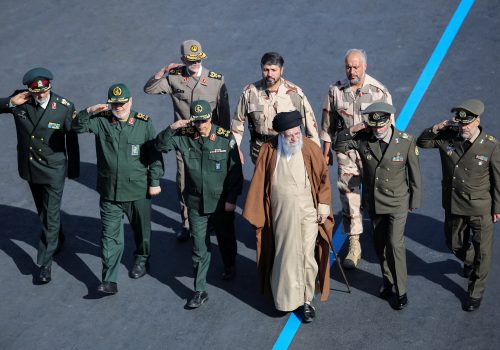What was Hamas thinking? And what is it thinking now?
The size, scale, and brutality of Hamas’s October 7 assault on Israel suggests that the group’s aim was to fundamentally change the strategic dynamic with Israel and the Palestinian Authority, and probably in the larger region, as well.
Hamas may have believed Israel was weakened, distracted, and divided by its internal political turmoil over the past year, making this a good time to strike. Perhaps Hamas thought a surprise attack would widen political divisions in Israel, upend the Israeli government, and sap the resilience and determination of the Israeli people to prevail, rather than produce the unity and resolve the world is currently seeing. Hamas may also have calculated that it had an opportunity to deal a knockout blow to the Palestinian Authority. The popularity of President Mahmoud Abbas and the Authority itself had been plummeting, and hardline factions, including Hamas cells, had begun to gain traction in the West Bank by taking the fight to Israel. The October 7 attack appears to have been specifically timed to coincide with the fiftieth anniversary of the 1973 Yom Kippur war—in which Israel’s apparent invulnerability was called into question by successful surprise attacks from Egyptian and Syrian armies—to catch the Jewish state off guard and deal it a major blow.
Hamas and its Axis of Resistance partners expect that rising pro-Hamas and anti-Israeli sentiment in the Arab world will prompt Saudi Crown Prince Mohammed bin Salman to halt efforts to openly embrace Israel for the indefinite future.
It also appears that a key aim of the attack was to derail the ongoing Saudi-Israeli talks aimed at normalizing relations between the two countries. Hamas, Hezbollah, and Iranian officials have publicly condemned the Saudi-Israeli discussions, and Hamas and Hezbollah officials reportedly also have cited the talks—which they view as a sellout of resistance to Israel’s presence in Muslim lands and a betrayal of the Palestinians—as a major motivation for Hamas’s October 7 assault on Israel. These groups recognize that the establishment of normal relations between Saudi Arabia and Israel poses a strategic threat to their cause that would strengthen the pro-Western countries in the region and leave the Iran-led “Axis of Resistance” isolated.
Concern over the apparent progress of the Saudi-Israeli talks appears to have prompted the Axis of Resistance to pursue greater unity of effort to combat the threat they believe it poses. According to media reporting, Hamas coordinated its attack plans with Iran and Hezbollah, and officials from all three organizations met in Beirut on several occasions in recent months to discuss the operation. Hamas probably had the final call on the specifics of its operational plan and the timing of its attacks, but Iranian funding, weapons, and training over many years have been key to Hamas’s increased military prowess.
Hamas leaders probably recognize that their attack on Israel—undoubtedly supported and endorsed by their Iranian patron—will heighten Saudi fears of Iran and desire for an eventual alliance with Israel to counter the Iranian threat. However, Hamas probably also believes that the Arab public will be cheering its attack and will rally behind Hamas in the face of large-scale Palestinian civilian casualties from Israeli military operations. Hamas and its Axis of Resistance partners expect that rising pro-Hamas and anti-Israeli sentiment in the Arab world will prompt Saudi Crown Prince Mohammed bin Salman to halt efforts to openly embrace Israel for the indefinite future.
After the October 7 attacks
Hamas probably calculated that Israel would respond with a major ground invasion to the horrific attacks the group has carried out, and most likely it has made preparations to bleed Israeli forces when they enter Gaza. Hamas probably also has placed its communications centers, fighters, and munitions among the civilian population, which will inevitably increase the number of civilian deaths. Hamas may have assessed that it can achieve a replay of previous wars with Israel, in which mounting Israeli military casualties and a rising death toll among civilians in Gaza resulted in domestic pressure in Israel and calls from the international community, including the United States, for Israel to accept a ceasefire. Hamas undoubtedly also plans to use the many hostages it has taken as leverage to get Israel to stop operations with Hamas still intact and able to claim victory.
However, Hamas may have misjudged both the international support it will enjoy and Israeli determination to sustain the fight. First, the sickening news of women being raped and innocent men, women, children, and elderly people being kidnapped and murdered has undermined sympathy around the world for the group’s claims to be the defender of Palestinians against Israeli oppression. These acts have also bolstered support for Israel’s claim that it must respond with great force to the threat Hamas poses. Even so, to avoid losing international backing for its military response, especially as its ground invasion of Gaza unfolds, Israel will need to show continued concern to minimize casualties and help preserve adequate humanitarian conditions for Palestinian civilians in Gaza.
Second, unlike in the past, the Israeli government probably will not face domestic pressure in the near-to-medium term to halt its offensive. The Israeli public and all major Israeli political parties have united right now behind destroying Hamas, as is evident in the formation of a unity government that includes key centrist opposition leader, Benny Gantz, a former defense minister and chief of the general staff of the Israel Defense Forces. As a result, Israel is likely to approach this situation much as the United States did Afghanistan and Iraq, grinding it out over the long term to try to crush Hamas and remove it as a threat.
Alan Pino served as US national intelligence officer for the Near East for fifteen years, retiring in 2020.
Further reading
Tue, Oct 10, 2023
Live expertise: Get the latest insight on the Israel-Hamas war
New Atlanticist By Atlantic Council experts
Atlantic Council experts are analyzing the rapidly unfolding events in the Middle East as they happen. Find the latest here.
Tue, Oct 10, 2023
What will Hezbollah do next? Here’s how the Hamas-Israel conflict could engulf the region.
New Atlanticist By Nicholas Blanford
Neither Israel nor Hezbollah appears to want an escalation, but the risks are high for a disastrous miscalculation.
Fri, Oct 13, 2023
It doesn’t matter whether Iran planned the Hamas attack—Tehran is still to blame
New Atlanticist By Jonathan Panikoff
For years, Tehran has provided Hamas the overwhelming majority of its funding, weapons, and training—all of which were leveraged for this attack.
Image: Palestinian protesters burn tires during a demonstration in support of Gaza, which has been under Israeli air strikes since October 7, near the Hawwara checkpoint, which is under Israeli control. The Islamic Resistance Movement Hamas called on all Palestinians in the West Bank to confront Israeli forces. Everywhere in the West Bank in response to Israel’s attack on Gaza, which claimed the lives of more than 1,500 unarmed citizens, including hundreds of children and thousands are wounded. (Photo by Nasser Ishtayeh / SOPA Images/Sipa USA)




